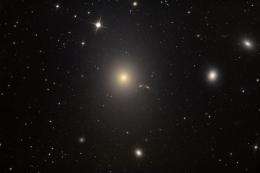The power of spin

(PhysOrg.com) -- Supermasssive black holes - objects with masses of millions or billions of suns - are found at the nuclei of dramatic galaxies like quasars where they are responsible for some of the most spectacular phenomena in the cosmos.
Their environments can, for example, generate narrow jets of particles that can travel across thousands of light-years of space at nearly the speed of light. These outflows, discovered at radio wavelengths, are thought to be powered by matter accreting onto a hot disk around the black hole. The physical processes that drive these jets and cause them to radiate are among the important outstanding problems of modern astrophysics.
One of the primary mechanisms thought to drive the outflows is matter accreting onto the vicinity of the black hole, during the course of which radiative and mechanical processes power the jets. But black holes can spin, and a single supermassive black hole can store as much energy as our Milky Way galaxy has radiated over its lifetime, or even more. CfA astronomers Brian McNamara, Paul Nulsen, and a colleague compare examine this vast energy source to see whether it might also be able to power such jets.
The scientists examined clusters of bright galaxies with active black holes in them. They considered the amounts of molecular gas available in these clusters for accretion onto the nuclear black holes, and compared the results to their model of spin-powered jets. They conclude that a spin-based scenario is consistent with the observations, although not necessarily better than accretion model. Although further clarification of the role each plays probably needs to wait until additional data can be obtained from new radio facilities, the new results show that spin is indeed an option that astronomers need to consider.
Provided by Harvard-Smithsonian Center for Astrophysics


















